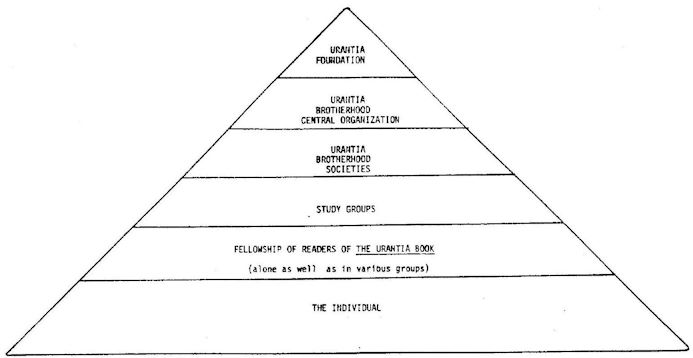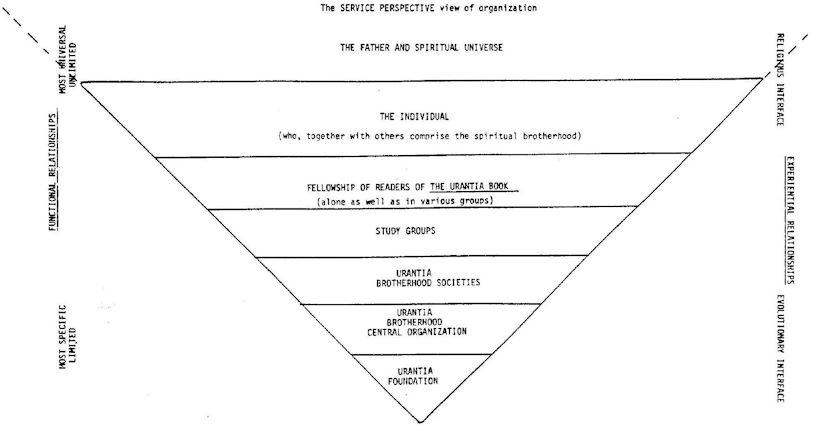© 1988 David Elders
© 1988 ANZURA, Australia & New Zealand Urantia Association
| Report On The South Pacific Regional Meeting Of Readers Of The Urantia Book | Vol 9 No 6 Nov 1988 — Index | Science And _The Urantia Book_ |
A talk given by David Elders at the Pacific Regional Meeting of readers of The URANTIA Book
Ranelagh House, Robertson, Australia 13 October 1988
“Concerning insight, the recognition of moral values and the discernment of spiritual meanings, all that the human mind can do is to discover, recognize, interpret, and choose.” (UB 196:3.10)
“To a man with a harmer, the whole world looks like a nail!” Anonymous.
What we each believe something to be and what it really is are often two very different things. For example, when one person calls another person an “American” or a “Frenchman” or an “Australian”, it is often meant to suggest a stereotypical view of who that person is. But, in reality, all that is really being said is where the person was born (not of his/her choice, incidentally) or their current place of residence. However, once said, the national label is a prejudice or bias which to some degree acts to control the relationship that person has with others. Since no one person ever fits the stereotype anyway, it is only through interaction on a personal level with the labeled person that the bias can drop away to be replaced by a relationship now less encumbered by preconception. But what has really changed? I would suggest that the only change is in the attitude of the person tempted to label another (using a label may just be an easy way to avoid having to think about a person very much).
Perhaps the same is true about what an organization is as well. Since an organization is not a person, but a mechanism, it is not self-acting. In the end, all organizations are really a collection of persons acting in some agreedupon way, together. Fear of an organization is misplaced; rather, any anxiety with regard to organizational intent or action would better be directed toward the people who comprise it. As in the example above, however, we should not be tempted too quickly to label the organization either good or bad, either useful or dangerous. If we fear it, we are already its slave and have fulfilled our own prophecy by the attitude we adopt, which may not necessarily represent the way it really is. If we approach organization with the attitude of using it as a mechanism to serve a particular purpose or function, we are in a position to master both the mechanism and our human tendency to abuse it for the control of others (who may unwittingly participate in the process by fearing organization).
How we look at URANTIA Brotherhood and URANTIA Foundation organizations exemplifies how a change in attitude can seemingly transfer these organizations from tools of power and control into mechanisms of service. On diagram A, the various relationships between these organizations and the individual readers of The URANTIA Book are depicted hierarchically in the normal human, business way. URANTIA Foundation is at the top, apparently in full control of the work of the individuals who comprise the entire reader community, thereby doing just what the book warns against, tempting us to divert our service from each other and God to the organization itself. However, diagram B shows what happens if we change our attitude toward and view of these organizations to be more in line with their stated purpose and reason for existence. In this view, what I have termed a “service view” each of the organizational elements serve the levels above themselves, ultimately serving each individual in his/her relationship with God, and the God in each and every other. In this model, the organizational element most closely tied to the evolutionary soil in which the revelation was planted is URANTIA Foundation, that organization responsible for the preservation of the text and the service marks designed to identify the originally-given material as mechanisms to protect it from misuse and distortion. Their work supports directly URANTIA Brotherhood, whose task it is to help with “the study and dissemination of the teachings of The URANTIA Book … through the medium of fraternal association…” and, as a result, all the study, sharing, personal relationship levels above. In this way, all the work is designed, ultimately, to serve (not manage or control) the integrity of each individual to relate directly and without intermediary with God.
Just as the potential of spirit existence resides in the mortal creature of animal origin and action, so the potential for true, collective service resides in the mechanism of the organization. In both cases, it is by our choosing that the potentials are realized. Fear is a poor motivation in both cases, and leads to the wrong achievements-continued animalistic behaviour in the person, abuse of power and control in the organization. The right attitude, however, will facilitate the proper choices enabling us together to use our organizations as a means to do our work on behalf of this revelation.
One final thought on this subject: If we tend to view the existing organizations now predominantly functioning in America as “American” and tie that view into the control model of organizational risk depicted in diagram A, we cannot achieve the dream of becoming a true planetary demonstration of the ability of these teachings to enable us to overcome virtually every obstacle to working together. We, thereby, will have allowed our fear to make our decisions for us and will have fulfilled our own prophetic concerns. If, however, we adopt an attitude toward these same organizational entities of utilizing them as the worldwide skeletal framework and support mechanism for our collective cooperation, and begin to identify ourselves as planetary citizens comprising a planetary organization with the purposes as stated, we can fulfill that vision, too, through a conscious decision-making process. Fear forces us to interact with reality in a protective mode to avoid taking risks; seeking a higher goal allows us to interact with reality in a more creative manner, so that we may actualize the potentials which exist. The quotations at the beginning of this paper seem to tell the tale.
DIAGRAM A
The human or business view of organization

This view is not acceptable and if enacted would lead to maintenance of organization as an end.
DIAGRAM B
The SERVICE PERSPECTIVE view of organization

This view desirable and would lead to utilization of organization as a means to the accomplishment of higher ends.
Over the coming years, many groups — good, bad, and indifferent — will seek to identify themselves with The URANTIA Book and claim its truths as their own. By coming together, voluntarily, in a single planetary organization expressive of our willingness to identify with a larger group of humankind, socially, at a level above the normal separators of language, race, national origin, and differences of opinion, etc., we have a unique opportunity to demonstrate to the world at large our commitment to the supreme principles of true cooperation so clearly elucidated in the book. At the same time, those other smaller organizations, whatever their value and motivation, will come and go as the personal expression of singular or small groups of like-minded individuals, but by.virtue of the existence of a planet-wide organization comprised of many different people. The URANTIA Book will not be so easily labeled — such as “American”, or “Christian”, or “Western”, or “Evangelists”, or “Promoters”, or “White”, or “Commercial”, etc. — thereby making it less accessible to other members of our planetary community who may themselves have identified with groups.
We must work together to prove to others that this teaching can enable us to transcend our surface differences, as it would seem revelation is meant to do. Since we are born into absolute diversity (by virtue of our unique personalities) and are seeking unity, it would seem that the oft-spoken risk of uniformity is slight. If we presume unity as already achieved and seek instead to expand our outer differences, we may experientially achieve neither true personality diversity nor unity. If with our help our organization achieves its intended purposes, to serve as collective support for the integrity of each, person’s unique reach toward God, we may be able to achieve and fully experience both the very unity and diversity of personality as sons and daughters of a common Father. If we keep our viewpoint aligned, we will remember that both The URANTIA Book and its associated organizations are not ends in themselves, but simply means.
| Report On The South Pacific Regional Meeting Of Readers Of The Urantia Book | Vol 9 No 6 Nov 1988 — Index | Science And _The Urantia Book_ |